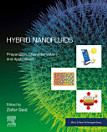Nano-refrigerants and Nano-lubricants: Fundamentals and Applications
Informazioni su questo ebook
Informazioni sull'autore
Dr. Zafar Said is currently working as a Distinguished Associate Professor in theDepartment of Mechanical and Aerospace Engineering at the United Arab EmiratesUniversity, UAE. He received his doctoral degree in Mechanical Engineering fromthe University of Malaya, Malaysia, and completed his postdoctoral research atKhalifa University, UAE. Dr. Said is a recognized leader in energy technology,nanofluids, and sustainable energy. His major areas of interest include heattransfer, solar energy systems, and advanced thermofluids. His research focuses onbattery thermal management, enhancement of solar collectors using nanofluidsand turbulators, and the development of stable nanorefrigerants andnanolubricants. He also applies artificial intelligence and machine learning topredict thermophysical properties and optimize energy systems. He is the recipientof several prestigious awards, including the Khalifa Award for Education asDistinguished University Professor (2025), the Future Pioneer Award inSustainability (2025), and Best Academic Research at the 13th Dubai Award forSustainable Transport (2024). He has also received the Research and InnovationAward from the UAE Ministry of Energy and Infrastructure (2022) and First Place inScientific Research at the Excellence and Creative Engineering Award (2023) by theSociety of Engineers, UAE. In recognition of his contributions, he has beenconsistently ranked among the world’s top 2% of scientists in the field of energy byElsevier BV and Stanford University. In addition to his academic duties, he activelyserves in editorial roles for several international journals and is a frequent keynotespeaker at global conferences.
Dr. Arun Kumar Tiwari is as a Professor at the Mechanical Engineering Department, Institute of Engineering & Technology, Dr. A.P.J. Abdul Kalam Technical University, India. Dr. Tiwari completed his PhD in mechanical engineering from the Indian Institute of Technology and M. Tech in mechanical engineering from Indian Institute of Technology. His research interests include solar thermal energy, nanofluidics (characterization, application, and thermophysical & optical properties) and heat exchangers. He has published numerous articles on reputable journlas, such as Physics Report, Renewable and Sustainable Energy Reviews, Energy Conversion and Management and more.





